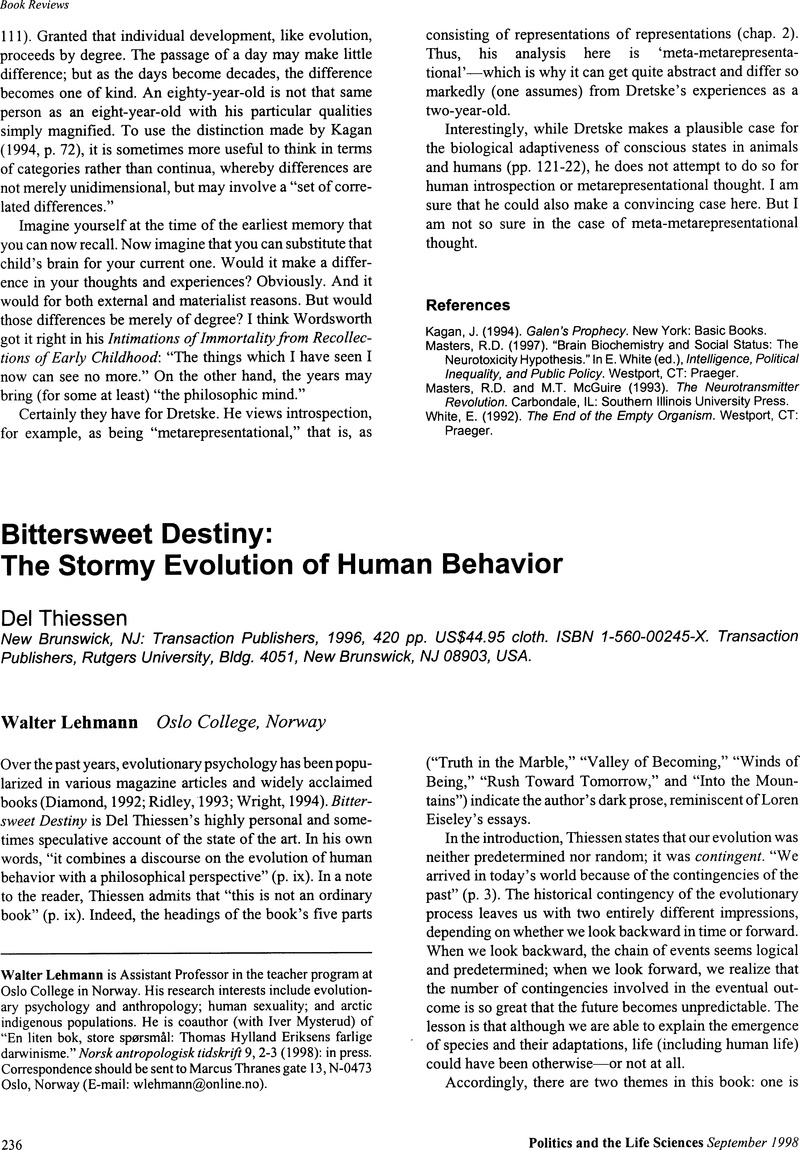No CrossRef data available.
Article contents
Bittersweet Destiny: the Stormy Evolution of Human Behavior. Del Thiessen. New Brunswick, NJ:Transaction Publishers,1996, 420 pp. US$44.95 cloth. ISBN 1-560-00245-X. Transaction Publishers, Rutgers University, Bldg. 4051, New Brunswick, NJ 08903, USA.
Published online by Cambridge University Press: 17 May 2016
Abstract
An abstract is not available for this content so a preview has been provided. Please use the Get access link above for information on how to access this content.

- Type
- Book Reviews
- Information
- Copyright
- Copyright © Association for Politics and the Life Sciences
References
Alcock, J. and Sherman, P. (1994). “The Utility of the Proximate-Ultimate Dichotomy in Ethology.” Ethology 96:52–62.Google Scholar
Barkow, J.H. (1989). Darwin, Sex, and Status: Biological Approaches to Mind and Culture. Toronto: University of Toronto Press.Google Scholar
Boyd, R. and Richerson, P.J. (1985). Culture and the Evolutionary Process. Chicago: University of Chicago Press.Google Scholar
Campbell, D.T. (1974). “Evolutionary Epistemology.” In Schilpp, P.A. (ed.), The Philosophy of Karl Popper. La Salle, IL: Open Court.Google Scholar
Diamond, J. (1992). The Third Chimpanzee: The Evolution and the Future of the Human Animal. New York: Harper Collins.Google Scholar
Durham, W.H. (1991). Coevolution: Genes, Culture, and Human Diversity. Stanford, CA: Stanford University Press.Google Scholar
Kitcher, P. (1985). Vaulting Ambition: Sociobiology and the Quest for Human Nature. Cambridge, MA: MIT Press.Google Scholar
Lorenz, K. (1977). Behind the Mirror: A Search for a Natural History of Human Knowledge. New York: Harcourt Brace Jovanovich.Google Scholar
Losco, J. (1981). “Ultimate vs. Proximate Explanation: Explanatory Modes in Sociobiology and the Social Sciences.” Journal of Social and Biological Structures 4:329–46.Google Scholar
Ridley, M. (1993). The Red Queen: Sex and the Evolution of Human Nature. New York: Macmillan.Google Scholar
Sperber, D. (1985). On Anthropological Knowledge. Cambridge: Cambridge University Press.Google Scholar
Watson, L. (1995). Dark Nature: A Natural History of Evil. London: Hodder and Stoughton.Google Scholar
Wrangham, R. and Peterson, D. (1996). Demonic Males: Apes and the Origins of Human Violence. Boston: Houghton Mifflin.Google Scholar
Wuketits, F.M., ed. (1984). Concepts and Approaches in Evolutionary Epistemology: Towards an Evolutionary Theory of Knowledge. Dordrecht: Reidel.Google Scholar
Wuketits, F.M. (1990). Evolutionary Epistemology and Its Implications for Humankind. New York: State University of New York Press.Google Scholar


